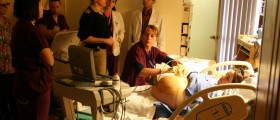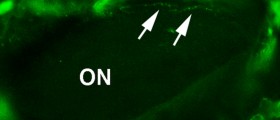
Down syndrome represents the most commonly reported chromosomal abnormality and one of several that can be properly diagnosed while the baby is still inside the uterus.
There are specific tests which can confirm or rule out the condition and allow a woman to decide whether she wants to keep the baby or opt for abortion.
Testing for Down syndrome is recommended for all women over the age of 35 because the incidence of Down syndrome increases as the woman gets older. There are two types of testing. The first one is a screening test which only estimates the risk for Down syndrome while the second one (including CVS and amniocentesis) provides with adequate information and confirms or rules out the disorder.Screening Tests for Down Syndrome
Even though there are many screening tests for Down syndrome not all of them are routinely performed. However, women may pay for additional tests not recommended by their doctors and have these done.
Initially, pregnant women undergo ultrasound and certain blood tests. If these indicate increased risk for Down syndrome, women further undergo specific diagnostic tests.
First Trimester Screening
A well experienced doctor performs a nuchal translucency (NT) scan. This examination is performed between 11th and 14th week of pregnancy. During the scan, the doctor measures the amount of fluid under the skin at the back of the baby's neck which is associated with the risk of developing Down syndrome.
Blood tests measure hCG (human Chorionic gonadotropin), PAPP-A (pregnancy associated plasma protein) and if the level of these two are abnormal, the risk for Down syndrome is high.
Thanks to previously mentioned, women who are at risk may further undergo CVS or amniocentesis, diagnostic tests that can confirm or rule out the syndrome. This way women may timely chose to continue with their pregnancy or to terminate pregnancy.Second Trimester Screening
In the second trimester a woman undergoes blood tests between 15th and 20th week of pregnancy. These include hCG (human Chorionic gonadotropin), uE3(oestriol), AFT (alpha fetoprotein) and inhibin A. Mothers who are highly likely to carry a child with Down syndrome have high levels of hCG and inhibin A while AFP and uE3 are reduced. Sometimes these indicators may be combined and different test created. So, there are the double, triple and quadruple tests. These blood tests are much more accurate in older women.
Still, by the time a woman obtains results she may be well into her pregnancy. The next step for women at risk is amniocentesis and definitive conformation or ruling out of Down syndrome. If the diagnosis is confirmed, the woman must consult her doctor about the most convenient way of terminating pregnancy. Termination of pregnancy in the second trimester is much more traumatic comparing to the same process performed in the first trimester.

















Your thoughts on this
Loading...